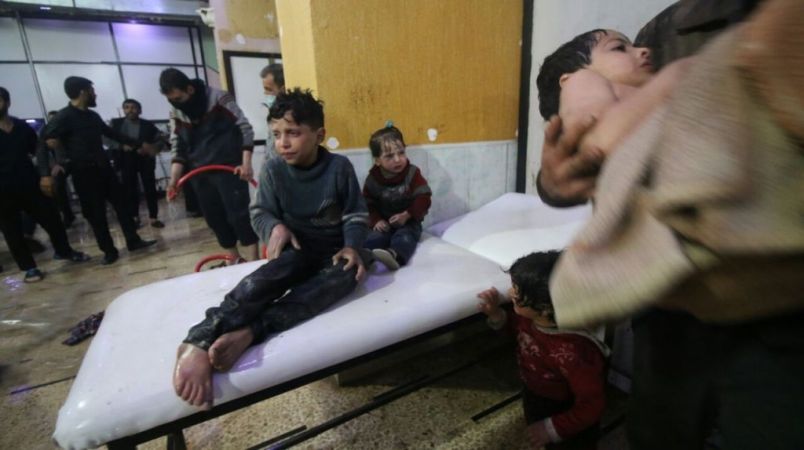The reports, which started circulating late Saturday, could not be independently verified, and the government denied allegations it had used chemical weapon in its assault on the town.
Meanwhile, state news agency SANA said the Army of Islam group agreed to leave Douma on Sunday, after three days of intensive government shelling and bombardment.
SANA said buses had been sent to the town to pick up prisoners released by the militants and to transport rebel fighters to opposition-held territory in north Syria.
The Army of Islam could not be immediately reached for comment.
Talks to surrender Douma collapsed on Friday, leading to the government to restart its campaign to take the town after ten days of calm.
Late Saturday, first responders reported they were treating residents for poison gas exposure.
The Syrian Civil Defense first responder group documented 42 fatalities but was impeded from searching further by strong odors that gave their rescuers difficulties breathing, said Siraj Mahmoud, a spokesman for the group, which is known as the White Helmets.
Douma has been devastated by close to five years of siege at the hands of government forces. It was once one of the hubs of the 2011 Arab Spring-styled uprising against President Bashar Assad’s government.
In recent weeks, government forces have recaptured villages and towns in the eastern Ghouta suburbs of the capital. Douma is the only town left holding out.
A joint statement by the Civil Defense and the Syrian American Medical Society, a relief organization, said that more than 500 people, mostly women and children, were brought to medical centers with difficulty breathing, foaming at the mouth, and burning sensations in the eyes. It said patients gave off a chlorine-like smell. Some had bluish skin, a sign of oxygen deprivation.
It said the symptoms were consistent with chemical exposure. One patient, a woman, had convulsions and pinpoint pupils, suggesting exposure to a nerve agent.
The Syrian Observatory for Human Rights said at least 80 people were killed in Douma on Saturday, including around 40 who died from suffocation. But it said the suffocations were the result of shelters collapsing on people inside them.
“Until this minute, no one has been able to find out the kind of agent that was used,” said Mahmoud, the White Helmets’ spokesman, in a video statement from Syria.
He said the government was also targeting homes, clinics, and first responder facilities with conventional explosives and barrel bombs. Most of the medical points and ambulances of the town have been put out of service.
Videos posted online by the White Helmets showed victims, including toddlers in diapers, breathing through oxygen masks at makeshift hospitals.
The Syrian government, in a statement posted on the state-run news agency SANA, strongly denied the allegations. It said the claims were “fabrications” by the Army of Islam, calling it a “failed attempt” to impede government advances.
“The army, which is advancing rapidly and with determination, does not need to use any kind of chemical agents,” the statement said.
The Army of Islam was negotiating with Russia, an ally of Damascus, to withdraw its fighters and allow government institutions back into the town, according to the Observatory. An agreement was said to have Russia deploy its military police to take guardianship of the town as Army of Islam fighters handed over their heavy weapons, the group added, but those talks collapsed on Friday, prompting the government to start shelling and bombing Douma indiscriminately.
Hundreds of fighters and their relatives had already left Douma for rebel-held areas in northern Syria.
The alleged gas attack in Douma comes almost exactly a year after a chemical attack in the northern Syrian town of Khan Sheikhoun killed dozens of people. That attack prompted the U.S. to launch several dozen Tomahawk cruise missiles at a Syrian air base. President Donald Trump said the attack was meant to deter further Syrian use of illegal weapons.
U.S. State Department spokeswoman Heather Nauert said that Washington was closely following “disturbing reports” of the alleged chemical weapons attack in Douma.
“These reports, if confirmed, are horrifying and demand an immediate response by the international community,” she said in a statement late Saturday.
President Donald Trump responded in tweets Sunday morning:
Many dead, including women and children, in mindless CHEMICAL attack in Syria. Area of atrocity is in lockdown and encircled by Syrian Army, making it completely inaccessible to outside world. President Putin, Russia and Iran are responsible for backing Animal Assad. Big price…
— Donald J. Trump (@realDonaldTrump) April 8, 2018
….to pay. Open area immediately for medical help and verification. Another humanitarian disaster for no reason whatsoever. SICK!
— Donald J. Trump (@realDonaldTrump) April 8, 2018
The Syrian government and its ally, Russia, denied any involvement in the alleged gas attack.
Maj. Gen. Yuri Yevtushenko was quoted by Russian news agencies on Sunday as saying Russia was prepared to send specialists to Douma to “confirm the fabricated nature” of the reports.
A chemical attack in eastern Ghouta in 2013 that was widely blamed on government forces killed hundreds of people, prompting the U.S. to threaten military action before later backing down.
Syria denies ever using chemical weapons during the seven-year civil war, and says it eliminated its chemical arsenal under a 2013 agreement brokered by the U.S. and Russia after the attack in eastern Ghouta.
___
Associated Press writer James Heintz in Moscow contributed to this report.



